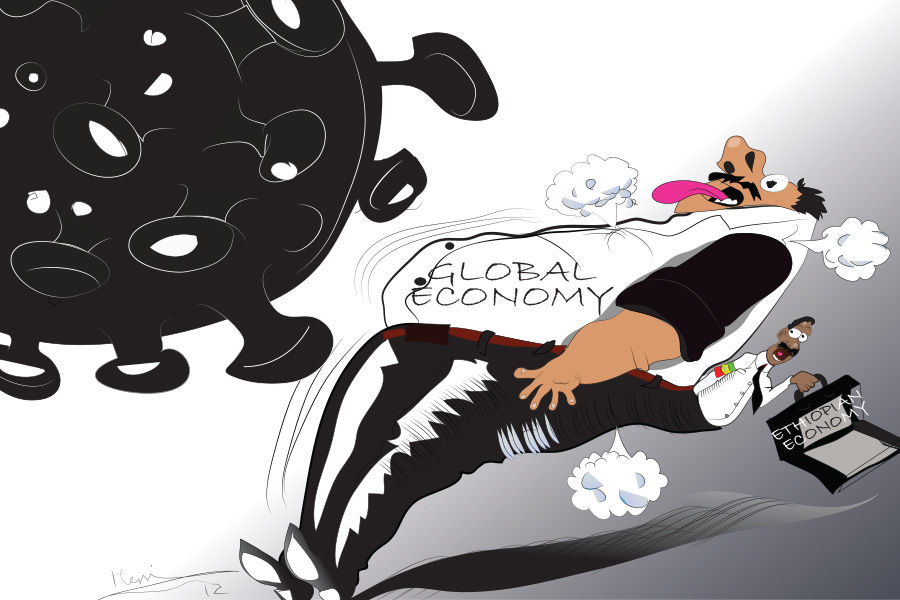
Commentaries | Jun 14,2025
Sep 2 , 2023
By Bjorn Lomborg
As surely as temperatures rise during the summer, climate alarmism serves up more stories of life-threatening heat domes, apocalyptic fires, and biblical floods; all blamed squarely on global warming. Yet, the data to prove this link is often cherry-picked, and the proposed policy responses are enormously ineffective.
Heatwaves are made worse by global warming. But saturation-level media coverage of high temperatures in summertime fails to tell the bigger story: Temperature-driven deaths are overwhelmingly caused by cold. Globally, a recent Lancet study found 4.5 million cold deaths, nine times more than global heat deaths. The study also finds that temperatures increasing half a degree Celsius in the first two decades of this century have caused an additional 116,000 heat deaths annually.
But warmer temperatures now also avoid 283,000 cold deaths every year. Reporting only on the former leaves us badly informed.
Across the world, governments have promised to achieve 'net zero' carbon emissions at a cost beyond 5.6 trillion dollars annually. Scared populations will, of course, be more likely to clamour for the perceived safety of such policies. But these policies help tackle heat and cold deaths very poorly. Even if all the world's ambitious carbon-cutting promises were magically enacted, these policies would only slow future warming. Stronger heat waves would still kill more people, just slightly fewer than they would have.
A sensible response would focus first on resilience, meaning more air conditioning and cooler cities through greenery and water features. After the 2003 heat waves, France's rational reforms, including mandatory air conditioning in care homes, reduced heat deaths 10-fold, despite higher temperatures.
Avoiding both cold and heat deaths requires affordable energy access. In the US, cheap gas from fracking allowed millions to keep warmer with low budgets, saving 12,500 lives each year. Climate policy, which inevitably makes the most energy more expensive, achieves the opposite.
Along with temperature spikes, alarming images of forest fires share the front pages this summer. It gives the sense that the planet is on fire. The reality is that since NASA satellites started accurately recording fires across the planet's entire surface two decades ago, there has been a strong downward trend. In the early 2000s, three percent of the world's land area burned each year. Last year, fire burned 2.2pc of the world's land area, a new record low. Yet, it would be a struggle to find this covered anywhere.
Fires have burned much more in the Americas this year than over the past decade. This has constantly been reported in the media. But fires have burned much less in Africa and Europe than in the last decade. Cumulatively to August 12, the Global Wildfire Information System (GWIS) shows that the world has burned less than the average over the last decade.
Pointing wrongly to climate change is dangerous because cutting emissions is one of the least effective ways to help prevent future fires. Much faster, more effective and cheaper solutions include controlled fires to burn away vegetation fuels that could otherwise result in wildfire, improving zoning and enhanced forest management.
Floods are similarly routinely ascribed to global warming. However, the UN Climate Panel's latest report has "low confidence in general statements to attribute changes in flood events to anthropogenic climate change." The experts emphasise that neither river nor coastal floods are statistically detectable from the background noise of natural climate variability. Indeed, the UN Panel finds that such floods will not be statistically detectable by the end of the century, even under an extreme scenario.
In the US, flood damage used to cost 0.5pc of GDP in the early 1900s. Now, it only costs one-tenth, because greater resiliency and development vastly outweigh any residual climate signal. While climate alarmism reaches new heights of scariness—with the UN Secretary General's "global boiling" claims entering ridiculous territory—the reality is more prosaic. Global warming will cause costs equivalent to one or two recessions over the rest of this century. That makes it a real problem, but not an end-of-the-world catastrophe that justifies the costliest policies.
The commonsense response would be to recognise that climate change and carbon-cutting policies incur costs. We should carefully negotiate a middle pathway where we aim for practical approaches that do the most to reduce damages at a reasonable cost.
To do better on climate, we must resist the misleading, alarmist climate narrative. Panic is a terrible advisor.
PUBLISHED ON
Sep 02,2023 [ VOL
24 , NO
1218]


Commentaries | Jun 14,2025

Commentaries | Sep 16,2023

Exclusive Interviews | Jan 24,2023

Radar | Apr 08,2024

Viewpoints | Oct 23,2021

Viewpoints | Sep 03,2022

Advertorials | Sep 05,2024

Editorial | Mar 14,2020

My Opinion | Jan 05,2019

Commentaries | Feb 24,2024

Photo Gallery | 174598 Views | May 06,2019

Photo Gallery | 164825 Views | Apr 26,2019

Photo Gallery | 155024 Views | Oct 06,2021

My Opinion | 136695 Views | Aug 14,2021
Editorial | Oct 11,2025

Dec 22 , 2024 . By TIZITA SHEWAFERAW
Charged with transforming colossal state-owned enterprises into modern and competitiv...

Aug 18 , 2024 . By AKSAH ITALO
Although predictable Yonas Zerihun's job in the ride-hailing service is not immune to...

Jul 28 , 2024 . By TIZITA SHEWAFERAW
Unhabitual, perhaps too many, Samuel Gebreyohannes, 38, used to occasionally enjoy a couple of beers at breakfast. However, he recently swit...

Jul 13 , 2024 . By AKSAH ITALO
Investors who rely on tractors, trucks, and field vehicles for commuting, transporting commodities, and f...

Oct 11 , 2025
Ladislas Farago, a roving Associated Press (AP) correspondent, arrived in Ethiopia in...

Oct 4 , 2025
Eyob Tekalegn (PhD) had been in the Governor's chair for only weeks when, on Septembe...

Sep 27 , 2025
Four years into an experiment with “shock therapy” in education, the national moo...

Sep 20 , 2025
Getachew Reda's return to the national stage was always going to stir attention. Once...

Oct 12 , 2025
Tomato prices in Addis Abeba have surged to unprecedented levels, with retail stands charging between 85 Br and 140 Br a kilo, nearly triple...

Oct 12 , 2025 . By BEZAWIT HULUAGER
A sweeping change in the vehicle licensing system has tilted the scales in favour of electric vehicle (EV...

A simmering dispute between the legal profession and the federal government is nearing a breaking point,...

Oct 12 , 2025 . By NAHOM AYELE
A violent storm that ripped through the flower belt of Bishoftu (Debreziet), 45Km east of the capital, in...